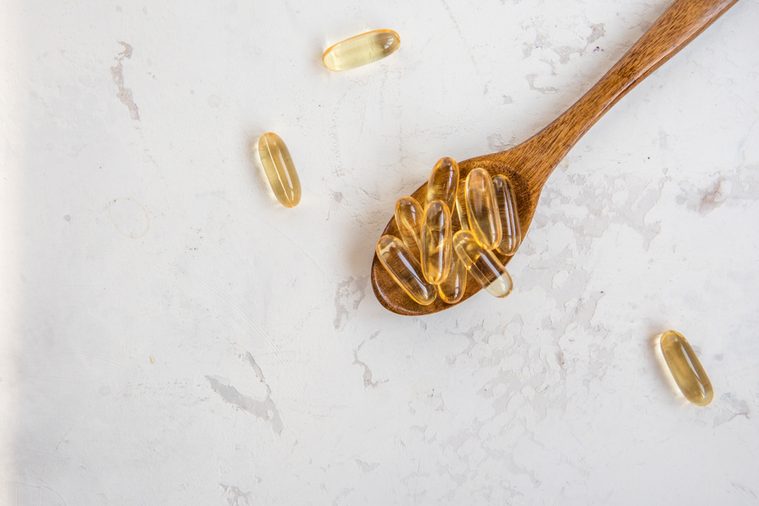
Exercising regularly
Getting your blood flowing with regular physical activity helps your brain as well as your muscles. In fact, it’s one of the most researched areas of Alzheimer’s prevention. “A lot of my research is on physical activity, and we’ve been able to definitively show that physical activity is very good for people who have genetic risk factors for Alzheimer’s disease,” says Stephen Rao, PhD, a neuropsychologist at the Cleveland Clinic’s Lou Ruvo Center for Brain Health. He’s found that physical activity helps reduce inflammation in the brain. Exercise also boosts blood and oxygen flow to the brain and helps cut the risk of obesity, diabetes, and hypertension—all factors that raise the risk of Alzheimer’s. There’s more: Exercise can also spark the growth of new brain cells and slow down the brain shrinkage that occurs with age. Aim for at least 30 minutes of vigorous aerobic exercise at least three times a week. Even if you hate to exercise, take a look at these best workouts for every age.

Getting a good night’s sleep
“Sleep hygiene is rapidly emerging in the field of Alzheimer’s research,” says Pierre Tariot, MD, director of the Banner Alzheimer’s Institute in Phoenix, Arizona. “There’s mounting evidence that sleep is one of the ways that we clear toxins from the brain and central nervous system.” Try to get at least eight hours of good sleep every night, and if you can’t, supplement your sleep time with naps.

Being MIND-ful about your diet
There are a number of diets being touted for their ability to help delay Alzheimer’s or slow its progression, and what they have in common is an emphasis on heart and brain health. “A heart-healthy lifestyle is a brain-healthy lifestyle,” says Dr. Tariot, explaining that “the cardiovascular system provides the pipes that deliver blood to our brain.” The well-known Mediterranean and DASH diets (for reducing high blood pressure) are good choices. Scientists have developed a mashup of the two especially for Alzheimer’s prevention—the MIND (Mediterranean-DASH Intervention for Neurodegenerative Delay) diet—which emphasizes foods that promote cognitive health: antioxidants like berries and leafy greens, and healthy fats like olive oil, fatty fish, and nuts. A study at Rush University found that people who adhere to this diet can lower their risk of developing Alzheimer’s by as much as 50 percent. Check out these 9 foods that can boost brain health.

Stress management
The stress hormone cortisol can affect the brain’s hippocampus and prefrontal cortex—the part of the brain responsible for problem-solving and processing emotions and complex thoughts; this is also one of the structures targeted by Alzheimer’s. Stress decreases the amounts of a protein hormone called klotho, which helps keep brain toxins in check. Plus, stress has also been linked to cardiovascular risk, which increases Alzheimer’s risk. “Anxiety takes up a lot of space in your brain,” says Elise Caccappolo, PhD, associate professor of neuropsychology at Columbia University Medical Center. “It sort of takes over the brain, which then can’t create more memories.” Caccappolo advises patients to try yoga, meditation, acupuncture, “or just doing less and taking more off your plate” to deal with stress. And if those steps don’t work, move on to therapy or medication. “Lift that cloud and let your brain do its work,” she says.

Socializing
“Loneliness is a risk factor for Alzheimer’s,” says Rudolph Tanzi, PhD, professor of neurology at Harvard University and director of Massachusetts General Hospital’s Aging and Genetics Research Unit. “And studies show that people with strong support networks, family, and friends have better health.” In a 2011 Rush University study, adults age 65 and over who were most socially active had a 70 percent lower risk of developing dementia than their least socially active peers. “When you talk to other people, you have to think about how you’re going to respond. That’s another source of blood flow to the brain,” says Caccappolo. Avoid these 16 everyday habits that can raise your risk of dementia.

Learning new things
Challenging your brain is good—but challenging it in completely new ways is even better when it comes to preventing or slowing the progression of Alzheimer’s disease. “There’s a value in doing something different from what you normally do,” says Dr. Tariot. So if you’re a champion crossword-puzzle solver, keep it up, but also try switching to another kind of puzzle every so often. Learning new things—a new language, a musical instrument, a sport, a complicated game like chess—helps increase the number of brain synapses (the parts of the nerve cell that transmit impulses to other cells). These cells can decrease with age and with Alzheimer’s disease. “So the more synapses you make and strengthen by learning new things, the more you can afford to lose later,” explains Tanzi. “It’s like putting money in the bank, but for your brain.”

Lowering high blood pressure and cholesterol
“The first thing we tell patients is to stay on top of their cardiovascular health,” says Caccappolo. “There’s a relationship between cardiac health, heart-healthy habits, and delaying the progression of cognitive changes.” A study called SPRINT (Systolic Blood Pressure Intervention Trial) MIND (Memory and Cognition in Decreased Hypertension) showed that people who lowered their blood pressure were able to stay sharper and think more clearly. “That’s almost proof positive that this cardiovascular-Alzheimer’s connection is really critical,” says Dr. Tariot. Don’t believe these 15 myths about Alzheimer’s.

Losing weight
“We just submitted an article about a study looking at people with a genetic risk factor for Alzheimer’s,” says Rao. “We found that the people who went on to develop mild cognitive impairment after five years were much likely to be overweight or obese when the study began.” If you’re overweight and not physically active, and you have the gene that raises your risk of developing Alzheimer’s, you’re going to have a higher probability of developing it. Know the difference between Alzheimer’s and dementia.

Brushing and flossing
Scientists now recognize oral hygiene as an important factor for optimizing brain health. “Some of the bacteria in the brain come from the gums,” says Tanzi. “Those bacteria can go to the heart or the brain and cause inflammation … which kills brain cells and is a major trigger for Alzheimer’s.” Tanzi recommends that everyone “be religious about flossing your teeth. Don’t just brush them; floss them, too!” One study of older men found that for each tooth lost, there was a link to increased cognitive decline.

Playing brain games
You can stimulate your brain to create new neurons and synapses without embarking on a mission to become fluent in a new language or proficient in creating art. Things like reading a book upside down (really) or combing your hair with your nondominant hand can have the same effect. “The reason we push brain teasers or other puzzles is about blood flow,” says Caccappolo. “It’s intellectual exercise. Anything that works your brain more than just sitting and watching TV.” A large study called ACTIVE (Advanced Cognitive Training for Independent and Vital Elderly) found that a special course of brain training focused on reasoning, memory, and speed improved cognition. Find out the 9 most powerful eating habits to protect your brain from Alzheimer’s.

Taking nutritional supplements
The jury’s still out on the benefit of supplements, but many doctors think they can’t hurt—and might help. “We tell patients that if you can take them without side effects, then there’s no harm in doing it,” says Caccappolo. “Things like ginkgo biloba, B vitamins, or vitamin D. Run it by your own doctor first. There is a placebo effect for some patients. Basically, if you feel like you’re getting some benefit, then it works.” Learn about the stages of Alzheimer’s.

Protecting your noggin
Wear helmets for bicycling and other activities where head injuries are a possibility, since these injuries, particularly concussions, have been linked to an increased risk of developing dementia later in life. The experts at Dementia Care Central, a resource website for the caregivers of people with Alzheimer’s disease, recommend that people also make sure to wear seat belts, eliminate tripping hazards at home, and try to avoid particularly hazardous sports like football that can involve repeated injuries to the head. Make sure you know the 10 early signs of Alzheimer’s.

Keeping your gut microbiome healthy
Scientists have been linking the health of our gut microbiome to the health of nearly every body system, and the brain is no exception. “Gut bacteria are so important for keeping you healthy. They can help heal plaques in the brain and stave off neuroinflammation,” says Tanzi. He explains that experiments involving mice with Alzheimer’s have shown that changing the gut bacteria can reduce the brain plaques characteristic of the disease. Other studies have shown that strengthening the gut microbiome can reduce neuroinflammation in the brain. “What challenges cognition is a loss of synapses, and what causes loss of synapses is mainly neuroinflammation,” says Tanzi. The Mediterranean, DASH, and MIND diets mentioned previously will help keep the gut microbiome healthy. “Those healthy gut bacteria love fiber and grain, peas, lentils,” says Tanzi. Check out the 50 best foods and recipes for gut health.

Taking medications
This is a huge area of research as scientists race to find the drugs, vaccines, or other interventions that can help prevent, delay, or slow the progression of Alzheimer’s. So far, though, there haven’t been any breakthroughs, although there are a few drugs that look promising. Tanzi has developed an “Alzheimer’s-in-a-dish” culture that allows scientists to test in the lab how a real brain might react to various drugs and supplements. Based on his findings, he helped develop a supplement called Percepta, made from a vine called cat’s claw. “It’s a natural product that’s very potent against inflammation,” explains Tanzi. “It hasn’t been used in a clinical trial yet, but it’s been very powerful in Alzheimer’s-in-a-dish. Since it’s a safe supplement, we put it out there.” Check out these 6 additional promising breakthroughs in Alzheimer’s research.

All of the above
The best protection against Alzheimer’s disease, based on the latest studies, may be to adopt as many of these preventive measures as you can, rather than relying on just one or two. “It’s called multimodal intervention,” explains Dr. Tariot. “There’s early evidence that going after all of these things, or the most salient things, makes cognitive impairment less likely to emerge over a period of years.” The landmark FINGER (Finnish Geriatric Intervention Study to Prevent Cognitive Impairment and Disability) study had participants adopt a healthy diet, regular physical activity, cognitive training, and social activities; there was also intensive medical monitoring to reduce health risks such as cardiovascular problems. “And the scientists who conducted this study estimate that really aggressive management of these lifestyle variables has the potential to reduce the incidence of Alzheimer’s by as much as 30 percent,” says Dr. Tariot, who adds that similar studies are now being launched in a dozen countries, including the United States. Now check out the 50 everyday habits that reduce your risk of dementia.